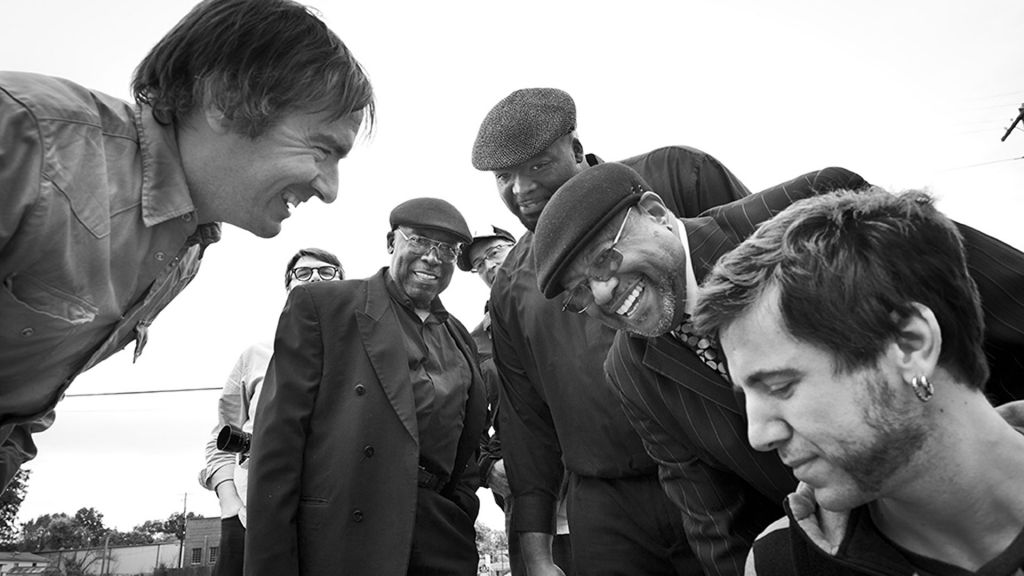
Muscle Shoals may bring you some familiar music — joyously familiar — but its story of a little studio (and then two little studios) in a small city in Alabama, and the man who made it happen, will be a lot less familiar to most. First-time filmmaker Camalier dives into the story of music producer Rick Hall’s FAME studios, and the musical magic his venture led to: simply some of the greatest rock and soul tunes ever.
The Boulder, Colorado-based filmmaker shines more light on how he first discovered Muscle Shoals and how its music called his name, in this exclusive interview.
What led you to make this film?
On a road trip west from the East Coast, I was driving through the South with my oldest friend in an American muscle car when we decided to turn around at one point and go back to Muscle Shoals. In the short time spent there, we found ourselves captivated by the power of the place and determined we needed to try and capture its essence, magic, and magnitude on film.
What is your own relationship to music, and the music portrayed in the film? Were you and your family big music fans growing up?
When I was younger I had always wanted to be a musician and I used to practice hours a day. I had wanted to be a professional musician but it was never going to happen for me. I always wanted perfect pitch and a voice and never had close to either. I loved some of the music from Muscle Shoals from the time I was in middle school but had no idea of the volume of music to come out of there.
Was it a challenge to get Rick Hall to open up for the film, or was he ready to tell his story? What about some of the iconic performers seen in the film — did you and your team have any challenges tracking them down?
Rick was both ready to tell his story and yet very weary of anyone who comes along. Sharing some of the more personal stuff took him getting to know and trust us over the course of a couple years.
And yes, tracking down musicians can take a lot of perseverance, good luck, and a great iconic music story that they knew needed to be told.
What other films and filmmakers inspired or informed the really sharp visual look of the film? It’s a very mature-looking work for someone who is fairly new to film directing.
I would say it was more of the opposite; watching a lot of documentaries that did not stimulate me visually inspired me to make a documentary that was beautifully shot. Filmmaking is a visual as well an audible medium so why not utilize those attributes to their fullest. My director of photography and good friend Anthony Arendt has such a great understanding of light and did a phenomenal job, as did all the camera operators.
What would you have liked to include in Muscle Shoals that didn’t make the final cut?
There are so many great artists who comprise the Muscle Shoals Story. So easily the answer is leaving out so much on so many of these other great Muscle Shoals artists, people like Dan Penn. Donnie Fritts, Eddie Hinton, Junior Lowe, Pete Carr….on and on and on.
What impact do you hope Muscle Shoals will have?
To make this story known, to get credit given to the guys behind all this amazing music, to help move people to understand that the greatest of art was made by black and white coming together at a time when to do so meant risking your life, that the greatest of tragedies can be overcome with determination, and that there is magic if you look for it.
And what were some of the biggest challenges you faced in making the film?
Probably the two greatest challenges were first determining how to gain access to the artists and musicians needed to help bring it to life, and secondarily to decide how to weave together the massive and diverse elements of the tale into a cohesive film.
Can you provide any updates about the two Muscle Shoals studios, are both FAME and the Swampers’ studios still in their hands and still active?
FAME is still owned and operated by Rick Hall and his son Rodney Hall. After seeing the film, the folks at Beats Electronics were so inspired they are pouring a ton of money into renovating 3614 Jackson Highway with plans to bring Artists there from around the country as well as having a philanthropic educational component to bring young musicians there to record.
What project(s) are you working on next — anything you can tell us about?
I’ve been pitched a bunch of documentary stuff but right now I am focusing on writing some narrative pieces that I will direct.
